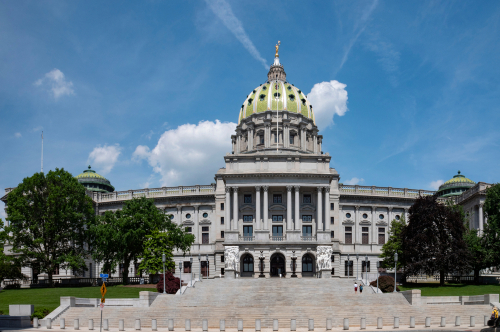
With oral arguments completed Tuesday, the Pennsylvania Supreme Court now begins its review of the constitutionality of the Regional Greenhouse Gas Initiative (RGGI), the first cap-and-invest regional initiative implemented in the United States.
“The illegal attempt to put Pennsylvania into RGGI — started by the Wolf administration and continued by the Shapiro administration — has been a complete disaster,” Pennsylvania Senate Majority Leader Joe Pittman (R-41) said Tuesday in a statement. “We’ve lost jobs, we’ve lost energy production, and the cost of electricity is going up.”
RGGI is a cooperative, market-based effort among 11 states — Connecticut, Delaware, Maine, Maryland, Massachusetts, New Hampshire, New Jersey, New York, Pennsylvania, Rhode Island, and Vermont — to cap and reduce CO2 emissions from the power sector.
In 2021, former Democratic Gov. Tom Wolf issued an executive order to authorize the state’s participation in RGGI and directed the state Department of Environmental Protection (DEP) to develop regulations for the commonwealth’s involvement in RGGI.
Pennsylvania joined RGGI in 2022 under Wolf’s administration and the DEP then wrote and introduced RGGI regulations, saying the money paid by energy plants is a fee, not a tax.
But then, spurred by state Republicans and others, the Pennsylvania Commonwealth Court in 2023 ruled that involvement in RGGI is unconstitutional because the program’s tax component may only be authorized by the General Assembly and not by an executive order from the governor.
For a tax to be constitutional, the General Assembly must first approve it, according to the conservative think tank, the Commonwealth Foundation, which says neither the governor nor state agencies can unilaterally enact and impose a tax.
In November 2023, Democratic Gov. Josh Shapiro appealed the lower court’s decision to the Pennsylvania Supreme Court, which has seven members — five Democrats and two Republicans.
During oral arguments on Tuesday, counsel supporting RGGI framed the program as a “market-based” approach and said participation in the program is legal.
Thomas Hazlett, the DEP’s lawyer, argued that requiring power producers to pay for allowances to release carbon dioxide falls within the department’s broad authority to control air pollution. “The policy choice that the legislature made and the duty that it imposed … is to prevent, control, reduce and abate air pollution,” Hazlett said. “Carbon dioxide is an air pollutant.”
Environmental groups agreed, arguing that Pennsylvania’s constitution guarantees protected public resources, including clean air, and the DEP’s plan is constitutional because it’s part of a program to protect citizen’s environmental rights.
Opponents, however, continue to argue that the Commonwealth Court’s ruling was accurate.
Commonwealth Foundation Senior Manager for Energy Policy André Béliveau posted on X Tuesday that in a proper cap-and-trade system, prices are set by the supply and demand among power plants.
“RGGI doesn’t work that way,” Béliveau said. “It sets a price floor, a minimum price for carbon credits, and uses a mechanism called the Cost Containment Reserve to inject extra credits if prices spike. But that reserve is limited. That’s not a free market. That’s a manipulated market, resulting in a government-imposed cost on energy producers to generate government revenue. That’s a tax.”
Brigid Landy Khuri, who represented Pittman, President Pro Tempore Kim Ward (R-39), and State Sen. Gene (R-23), chairman of the State Senate Environmental Resources and Energy Committee, argued that DEP overstepped its authority by joining the other Northeast states in RGGI.
“If the purpose is just to cap and regulate CO2, that’s one thing,” Khuri said. “If the purpose is … to change the entire dynamic of our electric generation system, that’s absolutely a policy decision that must be made in the General Assembly, that was not made here.”
Once the oral arguments ended Tuesday, Pittman said it was clear that the Commonwealth Court was right when it ruled RGGI unconstitutional, and said that once the Supreme Court rules on the issue, lawmakers will then be able to have serious discussions on the future of energy in Pennsylvania.
“I look forward to the Supreme Court’s swift decision so we can quit wasting time on unnecessary lawsuits and focus on implementing strong energy policies to benefit Pennsylvania families and businesses,” he said.
The Power PA Jobs Alliance — a coalition of labor unions and business leaders — also wants the Supreme Court to uphold the lower court’s ruling and permanently reject the RGGI tax regulation.
“We call on the court to reject the reckless pursuit of RGGI by foundation-funded environmental NGOs, whose agenda ignores dire warnings from grid operators and prioritizes ideology over the well-being of our communities,” the group said May 12.
“This outcome means everything to Pennsylvanians, as RGGI sacrifices… quality of life in the name of misguided policy,” added Béliveau.